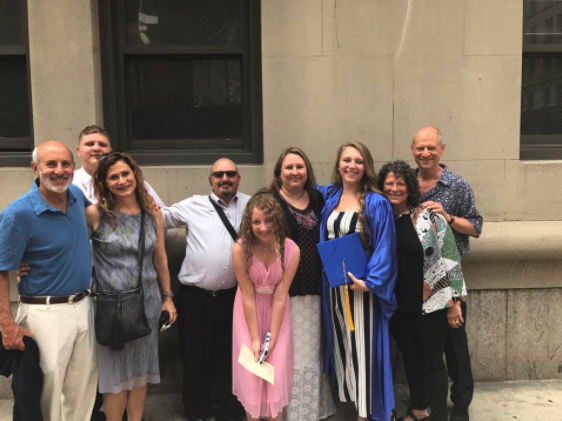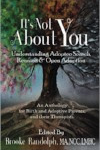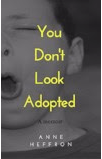Now that we are well into fall I am finally catching my breath to sit down to write a newsletter to you all. It has been a busy time. My youngest child just went off to college and I now have more time to reflect on the journey of raising and launching the two children that my husband and I adopted so many years ago now. Whew! It’s been a scramble all the way-learning and educating myself on their needs, trying to keep one step ahead on all the things I was completely unprepared for and naive about when we decided to form our family through adoption. I thought I would talk about some of those things today.
Myth #1: You are giving a child a better life, or “saving a life” when you adopt a child.
Who is to say that the life we offer a child is better than the one they might have had with their birth families? What we offer is a DIFFERENT life more often than not. Sometimes it may be better for them, but sometimes not. No matter what though, by adopting our children we have also participated in them experiencing a profound loss, that of biological family and culture. This is something I have really struggled to reckon with and I think it is a really hard thing for adoptive parents to face. In our wish to love we have also been a part of pain. That’s a challenging paradox from which to parent. If we cannot hear the ways in which our children express this grief because it causes us too much pain, we are letting them down. This is a crucial part of adoptive parenting that is very different from biological parenting. It takes strength to hear that not only are you not the solution, but you are part of the problem. THEN you can be part of the solution.
Myth #2: Environment is the most important influence in a person’s development.
I have been stunned by the degree to which genetics inform who we are. This I have learned through adoption. There are obvious qualities that are passed through genes like hair and eye color, race, etc. However, it is through my daughter’s reunion with her birth mom that I have learned things like: they both make the some face in reaction to a situation they don’t like, or that they both do not like to talk about things when they are upset. While I share common qualities with my biological siblings, I think I always attributed that to growing up in the same environment rather than our biological inheritance. This reality confirms the experience of “biological bewilderment” that adopted people report feeling in their adoptive families, an otherness that is clearly rooted in differences at a deep level.
Adoptive families face the challenge of acknowledging and traversing these differences. If, as an adoptive parent, you insist on your similarities rather than your differences, you are erasing this deep emotional truth for your child and silencing something that is hard, but important to acknowledge so that it can be expressed and not repressed. Adoption is so much about identity and identity erasure. If we need to erase our children’s identity so they can be like us, a part of us, we miss the opportunity to find out who they truly are and more importantly, for them to find out who they truly are. If they are prevented from finding a positive and unique identity of their own they are at greater risk for acting out in destructive ways as a means of killing their pain and finding another kind of identity, a negative identity.
Myth # 3: Adoptive families are just like biological families.
Anyone who has lived adoption knows this is a preposterous statement. Biological families do not have to deal with loss as the bedrock of their very formation. They do not have to bridge the gap of biological difference. They do to have to navigate a world in which people project their ideas and idealizations about adoption onto them. They do not have to raise children who are asked in the school yard, “Why didn’t your real mother keep you?” and then negotiate all the damage that does. They do not have to live as a disenfranchised group, rarely mentioned in many basic forms for medical and education services. They do not have to agonize about how to do the family tree homework assignment that schools keep insisting on assigning with no sensitivity to how that feels for adopted children.
Myth #4: Your budget for raising a family formed through adoption will be the same as for a biological family.
With all the issues that present themselves to adoptive families it becomes clear fairly quickly that services that cost money will be required to help everyone get through in as close to one piece as possible. At the very least, good adoption-aware therapy needs to be part of the budget. In addition, children coming from deprived environments are likely to have special needs that will require stamina and financial resources to manage. You need to be a strong advocate and work hard to provide.
As I write these thoughts I am aware that I am speaking to an audience of people who are already deeply involved in adoption either as parents or as other members of the adoption constellation. I know most of you know exactly what I am talking about here so this might be construed as preaching to the choir. However, I think that we receive so little validation for our real struggles and that they are so minimized by those who do not understand, that it’s important to feel acknowledged for what you already know but often do not get reflected back to you. I hope I have done some of that here. I know we could each write a book about our experiences and of course some of us have! On that note I would like to recommend two new books that are out:
The first is: It’s Not About You…… a new anthology in which I have a chapter.
Myth #1: You are giving a child a better life, or “saving a life” when you adopt a child.
Who is to say that the life we offer a child is better than the one they might have had with their birth families? What we offer is a DIFFERENT life more often than not. Sometimes it may be better for them, but sometimes not. No matter what though, by adopting our children we have also participated in them experiencing a profound loss, that of biological family and culture. This is something I have really struggled to reckon with and I think it is a really hard thing for adoptive parents to face. In our wish to love we have also been a part of pain. That’s a challenging paradox from which to parent. If we cannot hear the ways in which our children express this grief because it causes us too much pain, we are letting them down. This is a crucial part of adoptive parenting that is very different from biological parenting. It takes strength to hear that not only are you not the solution, but you are part of the problem. THEN you can be part of the solution.
Myth #2: Environment is the most important influence in a person’s development.
I have been stunned by the degree to which genetics inform who we are. This I have learned through adoption. There are obvious qualities that are passed through genes like hair and eye color, race, etc. However, it is through my daughter’s reunion with her birth mom that I have learned things like: they both make the some face in reaction to a situation they don’t like, or that they both do not like to talk about things when they are upset. While I share common qualities with my biological siblings, I think I always attributed that to growing up in the same environment rather than our biological inheritance. This reality confirms the experience of “biological bewilderment” that adopted people report feeling in their adoptive families, an otherness that is clearly rooted in differences at a deep level.
Adoptive families face the challenge of acknowledging and traversing these differences. If, as an adoptive parent, you insist on your similarities rather than your differences, you are erasing this deep emotional truth for your child and silencing something that is hard, but important to acknowledge so that it can be expressed and not repressed. Adoption is so much about identity and identity erasure. If we need to erase our children’s identity so they can be like us, a part of us, we miss the opportunity to find out who they truly are and more importantly, for them to find out who they truly are. If they are prevented from finding a positive and unique identity of their own they are at greater risk for acting out in destructive ways as a means of killing their pain and finding another kind of identity, a negative identity.
Myth # 3: Adoptive families are just like biological families.
Anyone who has lived adoption knows this is a preposterous statement. Biological families do not have to deal with loss as the bedrock of their very formation. They do not have to bridge the gap of biological difference. They do to have to navigate a world in which people project their ideas and idealizations about adoption onto them. They do not have to raise children who are asked in the school yard, “Why didn’t your real mother keep you?” and then negotiate all the damage that does. They do not have to live as a disenfranchised group, rarely mentioned in many basic forms for medical and education services. They do not have to agonize about how to do the family tree homework assignment that schools keep insisting on assigning with no sensitivity to how that feels for adopted children.
Myth #4: Your budget for raising a family formed through adoption will be the same as for a biological family.
With all the issues that present themselves to adoptive families it becomes clear fairly quickly that services that cost money will be required to help everyone get through in as close to one piece as possible. At the very least, good adoption-aware therapy needs to be part of the budget. In addition, children coming from deprived environments are likely to have special needs that will require stamina and financial resources to manage. You need to be a strong advocate and work hard to provide.
As I write these thoughts I am aware that I am speaking to an audience of people who are already deeply involved in adoption either as parents or as other members of the adoption constellation. I know most of you know exactly what I am talking about here so this might be construed as preaching to the choir. However, I think that we receive so little validation for our real struggles and that they are so minimized by those who do not understand, that it’s important to feel acknowledged for what you already know but often do not get reflected back to you. I hope I have done some of that here. I know we could each write a book about our experiences and of course some of us have! On that note I would like to recommend two new books that are out:
The first is: It’s Not About You…… a new anthology in which I have a chapter.
The second is: You Don’t Look Adopted by Anne Heffron, a wonderful memoir/biography/reflection on being adopted that I think should be the new manual for all people, not just adoption-connected people, to read to understand the adopted people in our lives. We all know someone!
My support groups for adoptive parents continue and there are openings both groups, but most especially for parents of younger children. The parents of tweens/teens has a couple of spots as well. Please pass this along to anyone you think might be interested




